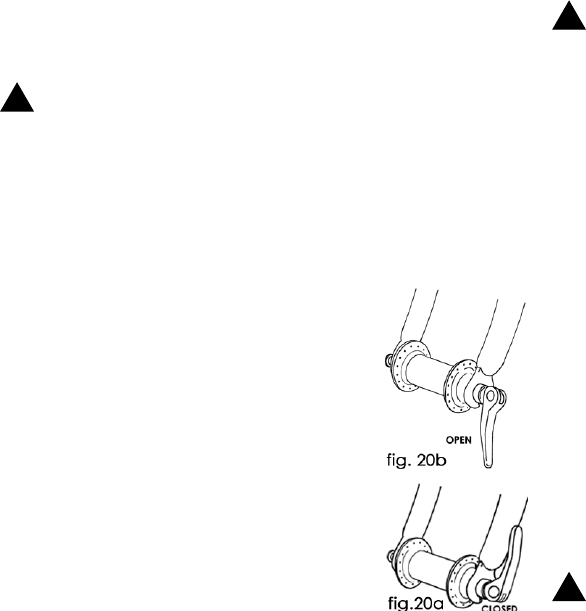
29
a matching hole in the front fork dropout (g. 12c).
Ask your dealer to explain the particular secondary
retention device on your bike.
!
WARNING: Removing or disabling the secondary retention
device is extremely dangerous and may lead to serious injury
or death. It also may void the warranty.
2. Removing and Installing Quick Release Wheels
a. Removing a Quick Release Front Wheel
(1) If your bike has rim brakes, disengage the brake’s quick-
release mechanism to open the clearance between the wheel
rim and the brake pads (See Section 4.A
gs. 7 through 10).
(2) Move the wheel’s quick-release
lever from the locked or CLOSED position
to the OPEN position (gs. 20a & b).
(3) If your front fork does no have a
secondary retention device go to step (5).
(4) If your front fork has a clip-on type
secondary retention device, disengage it
and go to step (5). If your front fork has
an integral secondary retention device,
loosen the tension adjusting nut enough
to allow removing the wheel; then go to
the next step.
(5) Raise the front wheel a few inches
off the ground and tap the top of the
wheel with the palm of your hand to knock
the wheel out of the fork.
b. Installing a Quick Release Front Wheel
!
CAUTION: If your bike is equipped with disk brakes, be
careful not to damage the disk, caliper or brake pads when
re-inserting the disk into the caliper. Never activate a disk
brake’s control lever unless the disk is correctly inserted in the
caliper. See also Section 4.A.
(1) Move the quick-release lever so that it curves away
from the wheel (g. 20b). This is the OPEN position.
(2) With the steering fork facing forward, insert the wheel
between the fork blades so that the axle seats rmly at the top
of the slots which are at the tips of the fork blades — the fork
dropouts. The quick-release lever should be on the left side
of the bicycle (g. 20a & b). If your bike has a clip-on type
secondary retention device, engage it.
(3) Holding the quick-release lever in the OPEN position with
your right hand, tighten the tension adjusting nut with your left
hand until it is nger tight against the fork dropout (g. 19).
(4) While pushing the wheel rmly to the top of the slots in
the fork dropouts, and at the same time centering the wheel
rim in the fork, move the quick-release lever upwards and swing
it into the CLOSED position (g. 19 & 20a). The lever should now
be parallel to the fork blade and curved toward the wheel.
To apply enough clamping force, you should have to wrap
your ngers around the fork blade for leverage, and the lever
should leave a clear imprint in the palm of your hand.
!
WARNING: Securely clamping the wheel takes considerable
force. If you can fully close the quick release without wrapping
your ngers around the fork blade for leverage, and the lever
does not leave a clear imprint in the palm of your hand, the
tension is insufcient. Open the lever; turn the tension adjusting
nut clockwise a quarter turn; then try again.


















